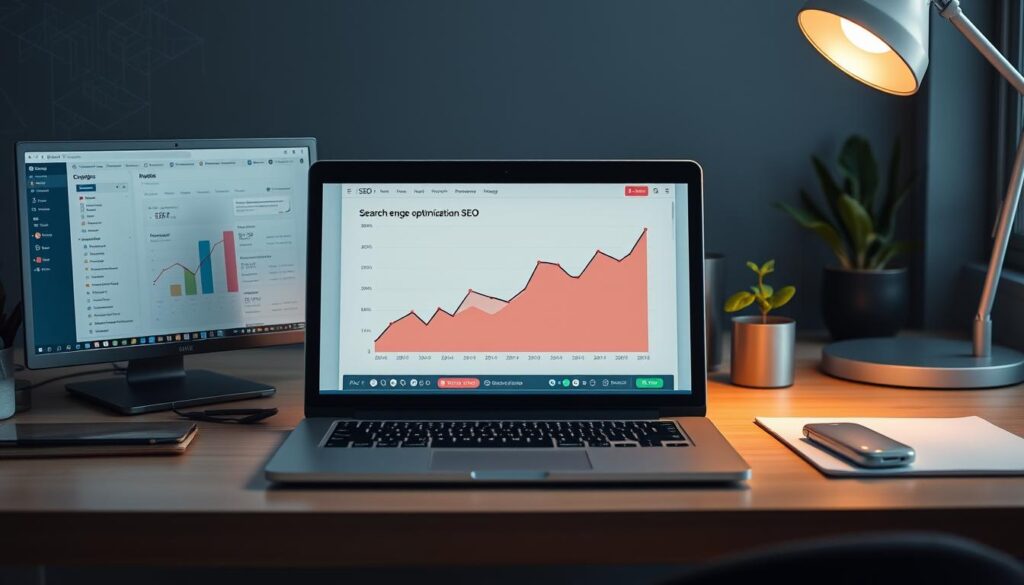By September 2024, there are about 4.3 billion indexed web pages worldwide. Many of these pages never make it to the top of Google Search results. This is because automated crawlers are always adding new content.
Search engine optimization helps content rank better by guiding these crawlers to the most relevant pages. This approach is often called what is seo – search engine optimization?. It combines seo basics, seo definition, seo meaning, and seo explanation into a framework that makes websites more visible.
SEO works by helping search engines understand what pages offer. It does this through clear site structure and smart keyword use. This improves both crawling and indexing.
People searching online can find the right content faster when a site uses seo basics. This is the core of what is seo – search engine optimization?. It’s a method that aids both users and technology in linking content to specific queries. This underlines its vital purpose in digital marketing.
Key Takeaways
- Search engines use automated crawlers for page discovery
- SEO focuses on clarity and user intent
- Keywords guide crawlers to relevant information
- Quality content boosts site visibility
- Structured pages create a solid seo foundation
Why SEO Is Crucial for Online Success
Millions of online journeys start with a search engine. This shows how vital seo is for businesses. Those who focus on seo have a better shot at reaching people looking for products or services.
Many users only look at the first page of search results. So, having strong website visibility is key to a brand’s success or failure.

“SEO helps show Google that you most deserve to rank… The better visibility your pages have in search results, the more likely you are to be found and visited.”
These words are important for both experienced marketers and beginners in seo. High organic rankings show a website’s authority. This comes from good on-page content and important seo factors like site speed, user experience, and backlinks.
By focusing on search optimization, businesses can grow continuously, not just temporarily.
Driving Website Visibility
Getting to the top of search results is key for getting clicks and building trust. About 75% of users only look at the first page. So, being visible online is a big advantage.
Brands that excel in this area can outdo their competitors and turn browsers into buyers.
Enhancing Organic Search Traffic
Organic search is a steady source of leads. Around 53% of all website traffic comes from non-paid searches. This means focusing on seo can bring long-term exposure.
This is good for any business wanting to attract visitors who are ready to buy.
What Is SEO – Search Engine Optimization?
SEO is more than just adding keywords to a webpage. It’s about making a site’s structure and content match search engine standards. Brands need good strategies to stay visible, as Google handles over 3.5 billion searches daily.
SEO is a long-term effort that focuses on site performance, relevance, and user experience. Google’s updates change how pages rank, so webmasters must keep up. This includes adapting to more mobile searches, as most now come from smartphones.
When people ask, what is seo – search engine optimization, experts talk about site structure, keyword use, and technical tweaks. Updates like Panda and Penguin punished sites that copied content or used bad links. Now, SEO marketing includes local and global strategies for better rankings.
Many businesses use SEO services to improve loading speed and mobile readiness. They also optimize meta titles and build backlinks for a stronger online presence. Google’s updates like Hummingbird and BERT focus on natural language, making sites produce genuine content. This approach offers long-term benefits over quick ad buys.
- 49% of marketers see organic search as the best return on investment.
- Most visits come from mobile devices, making mobile-friendly pages essential.
- Regularly publishing helpful articles is key for credibility.
These steps are the foundation for a strong online presence. A detailed optimization approach builds trust with audiences and keeps up with search engine changes. Well-structured pages can secure better rankings and stay up-to-date with new innovations.
Fundamental On-Page SEO Techniques
Many experts say planning is key before starting on-page seo strategies. Following official tips helps pages get seen more and engage users better. A good layout can make users stay longer, giving your page an edge.
Clear headings help readers navigate, and content that’s relevant and trustworthy encourages deeper dives.
“When optimizing content, you should make sure it covers relevant topics, includes keywords people would use, is up to date, and is better than your SERP competitors.”
Optimizing Meta Tags and Headings
Title tags and meta descriptions are a page’s first look. Google suggests keeping titles short, under 60 characters, to avoid cuts. Experts say on-page elements are about 50% of ranking factors.
External links boost authority, and internal links help both users and search engines.
Keyword Placement and Density
Seasoned pros use keyword optimization to attract the right visitors. They weave keywords into sentences naturally. Studies show relevant keywords can boost organic visits by up to 200%.
Long-tail expressions often have less competition, which can improve rankings. Using seo tools helps track and refine content.
Good seo practices mean using keywords wisely without stuffing. A balanced approach keeps content readable and engaging. Regular updates keep content fresh and relevant.
Featured snippets appear at the top of search results, answering questions. Schema.org data can make pages more visible with rich snippets like star ratings. This boosts rankings, user satisfaction, and authority.
Page audits keep content appealing to different audiences. These steps build a strong on-page strategy.
Off-Page Strategies and Link Building
Off-page seo aims to increase a site’s authority by creating quality connections outside its pages. Using helpful content to get backlinks is a key method. Studies show it can raise domain authority by 5-10%.
Having a strong brand presence helps in seo ranking. Companies known well appear higher in search results. Guest posting on reputable sites can boost referral traffic by 50%.
Some sites get help from an seo specialist for off-page improvements. Experts suggest targeted outreach, influencer partnerships, or fixing broken links. These efforts boost credibility and return on investment.
An seo audit finds content and link gaps that slow growth. It reveals new off-page strategies like digital PR. This keeps a brand visible in competitive markets.
Link building can increase domain authority by up to 10% and boost referral traffic by 50%. Content marketing is used by 70% of marketers to grow brand reach. A good social media strategy adds to this, making a brand more visible and trusted.
Tracking SEO Performance and Tools
Measuring success across multiple metrics is key to any good seo strategy. Over 200 factors affect a site’s visibility. Changes in keyword placements can happen due to backlink changes or updates from competitors.
Regular analysis helps spot trends and improve methods that meet user needs.
Looking at site authority, impression counts, and conversion rates shows if a page connects with visitors. It often takes months to see big changes in seo ranking. Tools like Google Analytics and Google Search Console help make decisions without costing extra. Paid options start at USD 99.
Conducting an SEO Audit
Audits show technical issues that could stop your seo goals. Problems like site crawl errors, slow page speed, or missing meta tags hurt visibility. Tools check each part and suggest fixes, making sure your site follows seo best practices.
This makes your site more trustworthy and ready for better engagement.
Using Analytics for SEO Insights
Today’s analytics give instant views of how content performs and what users do. They track bounce rates, CTR, and domain authority to guide improvements. Also, they show what leads to conversions, helping tailor updates to meet seo trends.
This keeps or boosts your site’s search visibility.
Conclusion
Businesses can reach more people by using search engines well. Studies show that 62% of people check online first when looking at new products. The top result can get up to 20.5% of clicks, showing how important it is to rank high.
Using the right seo keywords helps people find what they need. Websites that are easy to use and load fast get more visitors. A new domain can get up to 100,000 visitors a year, thanks to search traffic.
Search engines see these efforts as signs to rank a site higher. This means more free visitors every month. Keeping up with seo keywords and site performance helps businesses stay ahead. It’s a smart way to grow online and beat the competition.
FAQ
What are some SEO basics for beginners?
SEO basics include understanding how search engines work. It’s about using the right keywords and making sure content meets user needs. Beginners should focus on clear page structures, meta data optimization, and creating valuable content.
How does keyword optimization influence search engine rankings?
Keyword optimization is about picking the right terms and using them wisely. It’s about placing keywords in headings, content, and meta tags. This helps search engines see what your page is about, which can improve your ranking.
Why is off-page SEO important in an overall SEO strategy?
Off-page SEO builds trust by focusing on backlinks, social media, and brand mentions. It shows search engines your site is authoritative. By building links and engaging with communities, you can boost your SEO and visibility.
What are SEO trends to watch for when planning SEO strategies?
SEO trends change with Google updates and user behavior. Keep an eye on voice search, mobile optimization, user experience, and local content. Staying updated helps you keep your SEO strategies current.
How do SEO tools assist in conducting an SEO analysis?
SEO tools give insights on keywords, website performance, backlinks, and competitors. They help identify areas for improvement and track progress. Regular audits can find technical issues and content gaps.
Are there specific SEO tips and tricks for improving local search visibility?
For local SEO, use local keywords, claim business listings, and ensure consistent NAP information. Positive reviews also help. These strategies can increase local traffic and visibility.
When should a business consider hiring an SEO agency or SEO specialist?
Businesses might hire SEO experts for full strategies, lack of in-house skills, or need advanced support. An SEO specialist offers ongoing management, keyword research, link-building, and performance reviews.
Which SEO ranking factors matter most for search engine optimization success?
Google looks at many factors, but content relevance, user experience, and backlinks are key. Improving technical aspects like mobile-friendliness and page speed can also help.






